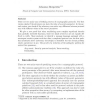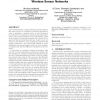291 search results - page 50 / 59 » Key Agreement Protocols and Their Security Analysis |
ENTCS
2006
13 years 8 months ago
2006
There are two main ways of defining secrecy of cryptographic protocols. The first version checks if the adversary can learn the value of a secret parameter. In the second version,...
CCS
2005
ACM
14 years 2 months ago
2005
ACM
The NRL Protocol Analyzer (NPA) is a tool for the formal specification and analysis of cryptographic protocols that has been used with great effect on a number of complex real-l...
WISEC
2009
ACM
14 years 3 months ago
2009
ACM
Time synchronization in highly distributed wireless systems like sensor and ad hoc networks is extremely important in order to maintain a consistent notion of time throughout the ...
MOBISYS
2005
ACM
14 years 8 months ago
2005
ACM
This paper presents a new pairing protocol that allows two CPU-constrained wireless devices Alice and Bob to establish a shared secret at a very low cost. To our knowledge, this i...
CHES
2005
Springer
14 years 2 months ago
2005
Springer
Embedded devices implementing cryptographic services are the result of a trade-off between cost, performance and security. Aside from flaws in the protocols and the algorithms us...


